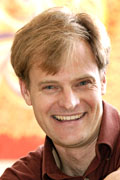 |
| Hans Huyssen. |
|
The composer Hans Huyssen, affiliated with the Department of Music at the University of the Free State (UFS), is to be the current recipient of the prestigious 2010 Helgaard Steyn Prize, the prize-winning work being Huyssen’s Proteus Variations (2006).Annually this award is administered and presented to a selected composer, painter, author, or sculptor by the Universities of the Free State and the North-West on a rotating basis. The judges for this year’s prize were Prof. Bertha Spies, Research Fellow, North-West University, and Professor Extraordinary, University of Pretoria, and Mr Noel Stockton, Senior Lecturer at the University of the Free State.
Hans Huyssen’s musical activities encompass the diverse poles of early and contemporary Western and African music, often in an attempt to assimilate the essential qualities from all these fields. His intense focus on contextuality suggests that he approaches music as a profoundly social force which has a particular role to play in our ‘new’ diversified South African society.
The Proteus Variations were commissioned by the Deutsche Welle Radio for the South African National Youth Orchestra 2006, and were premiered at the Beethoven Bonn Festival during 2006. These variations are described by the composer as “a musical representation of South Africa’s manifold Proteaceae”, named for the Greek god Proteus who, at will, was capable of assuming a spectrum of shapes and appearances. As the composer states: “It is worth noticing that a Protea is South Africa’s national flower. What could be more appropriate in providing a key to an opposite perception and understanding of the country’s diverse cultural expressions? In this regard it is my hope that the Proteus Variations may contribute a little to the wide scope of cultural responses necessary to begin to do justice to the extremely rich tapestry of our immediate cultural and natural surroundings”.
The prize of R170 000 will be awarded to Hans Huyssen by a representative of ABSA Trust, who is one of the trustees of the Helgaard Steyn Trust, in Bloemfontein on 8 November 2010.